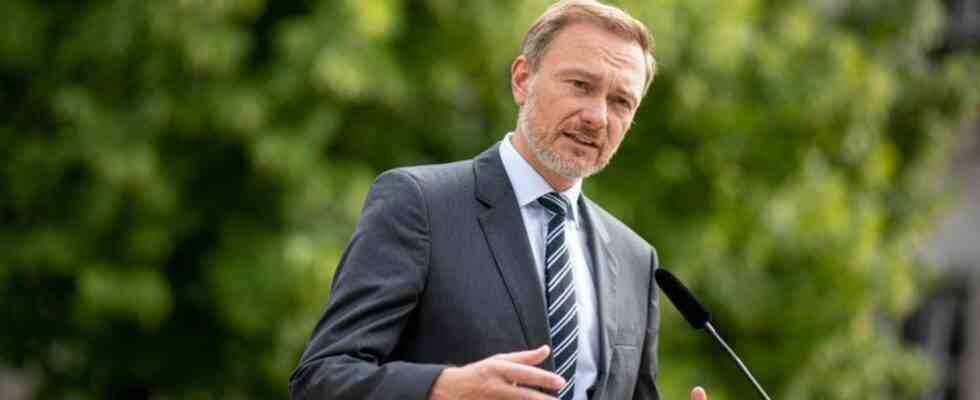financial crime
Authority against money laundering: Lindner wants to get “big fish”.
Christian Lindner makes a press statement in the courtyard of the Ministry of Finance. photo
© Fabian Sommer/dpa
The Minister of Finance wants to bundle the fight against money laundering in a new federal agency. This is primarily intended to prosecute the backers of illegal business – and as soon as possible.
According to Finance Minister Christian Lindner, the planned new federal agency against money laundering should start work as quickly as possible. “We want to act very quickly and there will be results in the course of this legislative period,” said the FDP politician in Berlin. “So we’re taking it at a fast pace.”
With the creation of the new authority, the previous structures in the fight against money laundering should be made more efficient. “There will certainly also be an increase in personnel, but essentially it is about a paradigm shift in the method,” said Lindner. Therefore, a larger increase in personnel is not to be expected. According to Lindner, talks within the federal government about the new authority are still ongoing. “We are talking to the federal states and also to the staff councils.”
According to reports, the Federal Ministry of the Interior is more in favor of strengthening existing structures than setting up a new federal authority. Lindner’s ministry had sent the interior ministry a concept. So far, however, there has been no agreement on certain points that the Interior Ministry believes could be problematic.
The new federal authority should bundle the fragmented competencies and, according to Lindner, encompass several pillars. A new Federal Financial Criminal Police Office is to be given genuine investigative powers. Responsibility for enforcing sanctions should be placed in one place. The previous anti-money laundering unit FIU is to determine as a further pillar which suspicious activity reports are being investigated. According to Lindner, there should also be a central office for the supervision of the non-financial sector at the federal level in order to coordinate the responsibilities of the federal states. It is about the gambling or real estate industry, where a particularly large amount of black money is smuggled back into the regular economic cycle.
“The big fish are swimming away from us”
“In Germany we take great care of the small fish in financial crime. But the big fish swim away from us,” said Lindner. One therefore wants to approach the backers in the future. To do this, follow the money trail. “Our goal is a more effective fight against financial crime, more effective enforcement of sanctions and stronger laws to protect honest taxpayers and honest traders from those who don’t follow the rules.”
Basic praise for the proposal came from the German Customs and Finance Union. We welcome the approach of bundling competencies, it said. In addition, the burden of proof for money laundering must be reversed. “An accused citizen must prove for himself that he is not involved in illegal transactions. Suspects must be able to be forced to disclose their sources of inexplicably high wealth.”
The police union was also generally positive. However, the deputy chairman, Frank Buckenhofer, raised the question of whether the Customs Criminal Police Office should actually be merged into the new authority or whether “a new, additional parallel structure with even more authorities” should be created at the Federal Ministry of Finance.
Criticism from Bavaria
North Rhine-Westphalia’s Finance Minister Marcus Optendrenk (CDU) called for transparent involvement of all relevant authorities. It is important that the responsibilities of the tax administration of the federal states are not affected. Criticism came from Bavaria: the federal government already has large authorities that could devote themselves to the topic, Finance Minister Albert Füracker (CSU) told the “Handelsblatt”. The solution does not lie in an additional “mammoth authority”.
The parliamentary group leader of the Greens, Andreas Audretsch, thinks it is right to “concentrate on the big fish, to focus on complex money flows and to give the German patchwork quilt structure in supervision”. But Lindner’s suggestion is not enough. “At the same time, we have to get the other projects under the coalition agreement off the ground,” said Audretsch. This applies, for example, to the cash ban when buying real estate and the reform of the transparency register in order to end the concealment of the true owners of real estate.

